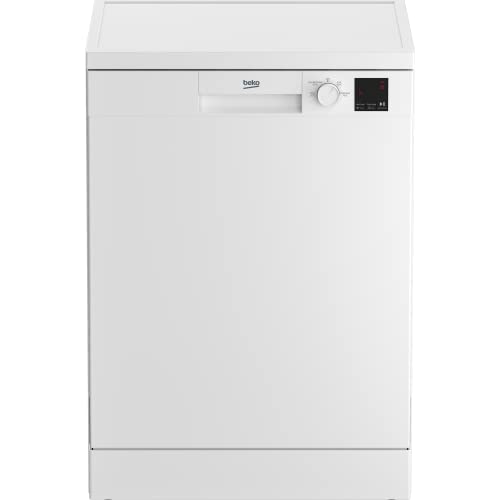




Have you ever opened your refrigerator door only to be met with a foul odor, even when there’s no sign of spoiled food? If so, you’re not alone. Many people experience this unpleasant smell in their fridges, and it can be quite frustrating to try and find the source.
The first thing to understand is that the smell is likely coming from bacteria or mold that has taken hold in your refrigerator. These organisms thrive in damp, dark environments, making your fridge the perfect breeding ground.
There are several possible causes for the bad smell in your fridge. One common culprit is spills that have not been properly cleaned. When liquids such as milk, juice, or sauces are left to sit and rot in your fridge, they can create a strong odor that permeates the entire appliance. Another possible cause is expired condiments or other food items that have gone bad without you realizing it. Even if the main dish in your fridge is fine, an old jar of pickles or a bottle of salad dressing could be the source of the smell.
Fortunately, there are solutions to eliminate the bad smell in your fridge. The first step is to remove all the contents of your fridge and thoroughly clean it. Use a solution of warm water and mild dish soap to clean the shelves, drawers, and walls. Be sure to pay extra attention to any spills or stains that may be harboring bacteria. After cleaning, you can wipe down the interior with a mixture of equal parts water and vinegar to help neutralize any remaining odors. Finally, place an open box of baking soda or a bowl of activated charcoal in your fridge to absorb any lingering smells.
Why Does My Fridge Smell Bad When There’s No Spoiled Food – Discover the Causes and Solutions
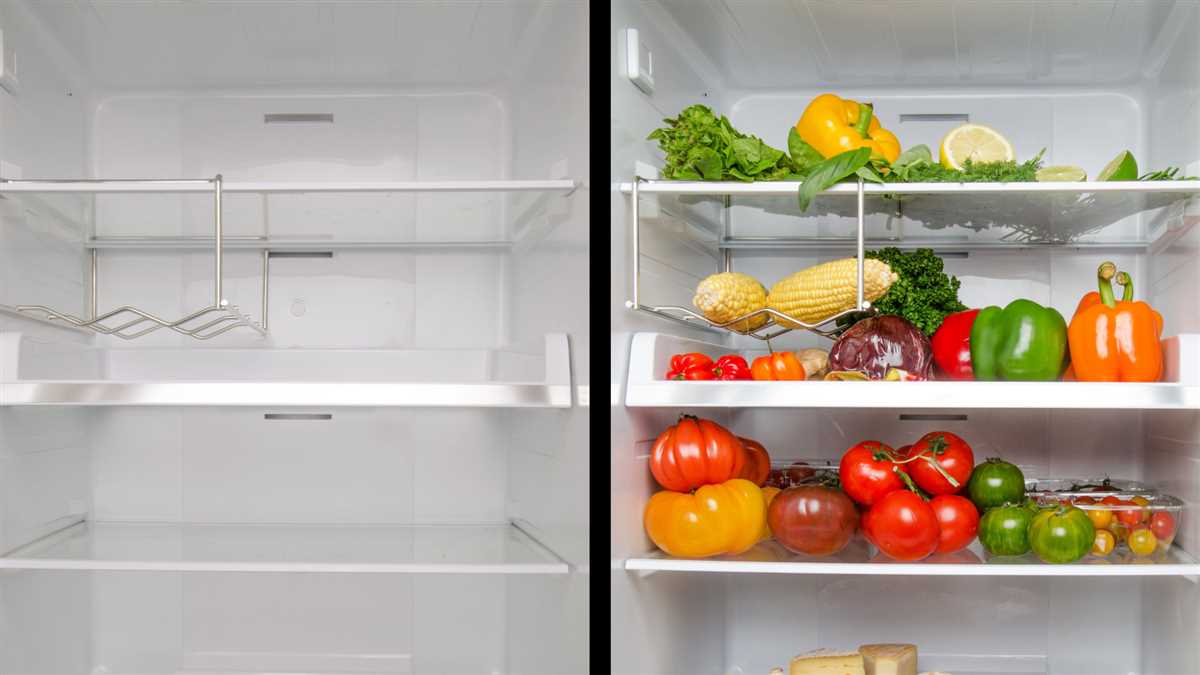
Introduction
It can be frustrating to open your fridge and be hit with a foul odor, especially when you can’t find any spoiled food causing it. There are several reasons why your fridge might smell bad, even when there’s no obvious culprit. In this article, we will explore the possible causes of the unpleasant odor and provide you with solutions to eliminate it.
Possible Causes
1. Odor from previous spills and leaks: Over time, food particles can accumulate in hard-to-reach areas of your fridge, such as the bottom or behind the drawers. These hidden spills and leaks can lead to the growth of bacteria, resulting in a bad smell.
2. Dirty fridge components: The shelves, drawers, and seals of your fridge can harbor trapped food debris and bacteria if not cleaned regularly. This buildup can contribute to a persistent odor in your fridge.
3. Mold and mildew growth: Moisture inside your fridge can create an environment for mold and mildew to flourish. Even a small amount of mold can produce a strong, unpleasant smell.
4. Contaminated water dispenser or ice maker: If your fridge has a water dispenser or ice maker, it’s important to regularly clean and sanitize these components. Over time, bacteria can grow in the water lines and filters, resulting in a foul smell.
Solutions
- Clean the fridge: Start by removing all the food from your fridge and throw away any expired items. Then, take out the shelves, drawers, and seals and wash them with warm, soapy water. Use a mixture of baking soda and water to clean the inside of the fridge, including the walls and door seals.
- Check for hidden spills: Inspect the bottom of your fridge and behind the drawers for any spilled liquids or food particles. Clean these areas thoroughly to eliminate the source of the odor.
- Remove mold and mildew: If you spot any mold or mildew in your fridge, mix equal parts of water and vinegar and use a cloth to wipe down the affected areas. Make sure to dry them thoroughly afterwards.
- Sanitize water dispenser and ice maker: Refer to your fridge’s user manual for instructions on how to clean and sanitize the water dispenser and ice maker. Regularly replace the filters and clean the water lines to prevent bacterial growth and odors.
- Use odor-absorbing materials: Place an open box of baking soda or a bowl of activated charcoal inside your fridge to absorb any lingering odors. These natural odor absorbers can help freshen up the air inside your fridge.
Preventive Measures
To avoid future bad odors in your fridge, it’s important to follow these preventive measures:
- Clean spills and leaks immediately.
- Regularly clean the shelves, drawers, and seals of your fridge.
- Keep your fridge dry and free from excessive moisture.
- Rotate and consume food before it spoils.
- Regularly replace water filters and clean water dispensers and ice makers.
- Store strong-smelling foods in airtight containers or bags.
Conclusion
Although it can be puzzling, a smelly fridge without spoiled food is a common issue. By identifying and addressing the possible causes, such as hidden spills, mold, or dirty components, you can eliminate the unpleasant odor and maintain a fresh-smelling fridge. Remember to implement preventive measures to keep your fridge odor-free in the long run.
Common Causes of Bad Smell in Fridge
There are several common causes of a bad smell in your fridge even when there is no spoiled food present. Understanding these causes can help you identify and eliminate the unpleasant odors.
1. Bacteria and Mold Growth: One of the most common culprits of fridge odors is the growth of bacteria and mold. These organisms can multiply quickly in the warm, moist environment of a fridge, especially if there are spills or food residue that have not been properly cleaned.
2. Spoiled Food Outside the Fridge: Sometimes, the source of the bad smell is not actually inside the fridge but outside. Check your fridge surroundings for any hidden food that may have fallen or spoiled nearby.
3. Improper Food Storage: Storing food improperly can also lead to unpleasant odors. Make sure that all food items are tightly sealed in containers or bags to prevent any odors from spreading.
4. Dirty Fridge Interior: If you haven’t cleaned your fridge in a while, it could be the cause of the bad smell. The accumulation of spills, crumbs, and food residue can create an environment that promotes the growth of bacteria and mold, resulting in odors.
5. Odor Transfer: Sometimes, odors can transfer from one food item to another. For example, if you have a strong-smelling cheese in your fridge, other foods nearby may absorb the odor and develop a bad smell.
6. Stagnant Water: Water that has accumulated in the fridge, such as from leaking containers or condensation, can also contribute to bad smells. Make sure to regularly check for any standing water and clean it up promptly.
7. Old or Expired Food: Even if the food is not visibly spoiled, it may still be past its expiration date and can cause unpleasant odors. Check the expiration dates on all your food items and discard any that are expired.
By addressing these common causes of bad smells in your fridge, you can keep your fridge smelling fresh and clean. Regular cleaning, proper food storage, and attention to spills and leaks can go a long way in eliminating unpleasant odors.
Bacterial Growth and Odor Formation
Bacterial growth is a common cause of foul smells in refrigerators, even when there is no apparent spoiled food. Bacteria thrive in moist and warm environments, making the refrigerator an ideal breeding ground. The growth of bacteria can be accelerated by a variety of factors, including improper storage and cleaning practices.
When bacteria multiply, they release metabolic byproducts that can produce strong, unpleasant odors. These byproducts can interact with other compounds present in the refrigerator, such as spilled food or liquids, resulting in even more potent smells. This is why a lingering odor may persist, even after thorough cleaning.
Common Causes of Bacterial Growth and Odor Formation
- Inadequate temperature control: A refrigerator set at a temperature range of 37-41°F (3-5°C) helps slow down bacterial growth. Temperatures above this range can promote bacterial proliferation, leading to odor formation.
- Poor ventilation: Insufficient air circulation in the refrigerator can create pockets of stagnant air, which provide an ideal environment for bacterial growth and odor development.
- Contaminated spills and leaks: Even small spills or leaks can provide a breeding ground for bacteria. If left uncleaned, these areas can become reservoirs of microbial growth and emit foul odors.
- Expired or forgotten food items: Expired or forgotten food items can decompose and provide nutrients for bacteria. Additionally, the decomposition process itself can produce strong odors.
- Uncleaned containers and shelves: Residual food particles or spills on containers and shelves can harbor bacteria and contribute to a foul smell. Regular cleaning and disinfection can help prevent odor formation.
Solutions to Prevent Bacterial Growth and Odor Formation
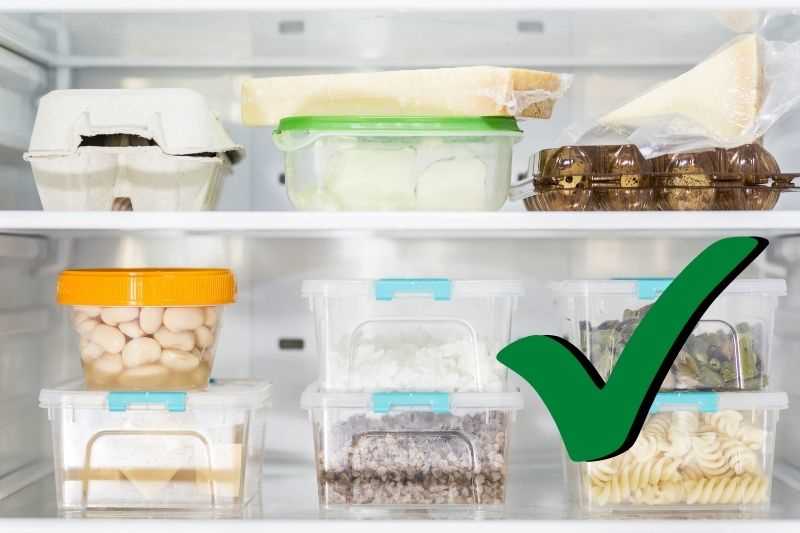
To prevent bacterial growth and eliminate unpleasant odors in your refrigerator, it is important to follow good hygiene practices and perform regular maintenance:
- Set and maintain the refrigerator temperature within the recommended range of 37-41°F (3-5°C).
- Keep the refrigerator clean by wiping spills and leaks immediately. Regularly clean the interior with a mild detergent and warm water.
- Check for expired or forgotten food items regularly and discard them promptly.
- Avoid overcrowding the refrigerator, as it can inhibit proper air circulation.
- Periodically remove and clean containers, shelves, and drawers. Use a mixture of vinegar and water or a disinfectant specifically formulated for refrigerators.
- Consider using baking soda or activated charcoal to absorb lingering odors. Place an open container of either substance inside the refrigerator.
- Ensure proper ventilation by not blocking the air vents inside the refrigerator.
By taking these preventive measures and maintaining good hygiene practices, you can minimize bacterial growth and keep your refrigerator smelling fresh and clean.
Mold and Mildew Issues
Mold and mildew are common causes of bad odors in refrigerators. These fungi thrive in dark, damp environments, making the interior of a fridge an ideal breeding ground for their growth.
Causes of Mold and Mildew Growth
- Moisture: Excess moisture in the fridge, whether from spills, leaks, or high humidity, can promote mold and mildew growth. It is essential to address any sources of moisture to prevent their development.
- Food Residue: Leftover food residue or spills can provide a food source for mold and mildew to grow. Cleaning up spills immediately and regularly wiping down the interior of the fridge can help prevent their growth.
- Poor Ventilation: Inadequate airflow inside the refrigerator can create an environment conducive to mold and mildew growth. Ensure that all air vents are clear and unobstructed for proper ventilation.
Consequences of Mold and Mildew Growth
Mold and mildew growth not only cause unpleasant smells but also pose potential health risks. Breathing in mold spores can lead to respiratory problems, allergies, and other adverse health effects. Therefore, it is crucial to address any mold or mildew issues promptly.
Preventing and Removing Mold and Mildew
To prevent mold and mildew growth in your refrigerator, follow these steps:
- Regularly clean the interior of the fridge with a mixture of water and vinegar or mild soap to remove any food residue or spills.
- Inspect and fix any sources of moisture, such as leaks or condensation, which may be contributing to mold and mildew growth.
- Avoid storing uncovered or spoiled food in the fridge, as they can provide a food source for mold and mildew.
- Ensure proper ventilation by keeping the air vents clear and unobstructed.
If you already have mold or mildew growth in your fridge, take the following steps to remove them:
- Empty the refrigerator and discard any spoiled food.
- Wipe down the interior of the fridge with a mixture of water and bleach or hydrogen peroxide to kill the mold and mildew. Be sure to wear gloves and provide proper ventilation while doing so.
- Thoroughly dry the interior of the fridge before restocking it with food.
By taking preventative measures and addressing mold and mildew growth promptly, you can eliminate bad odors and create a healthier environment in your refrigerator.
Improper Cleaning and Maintenance
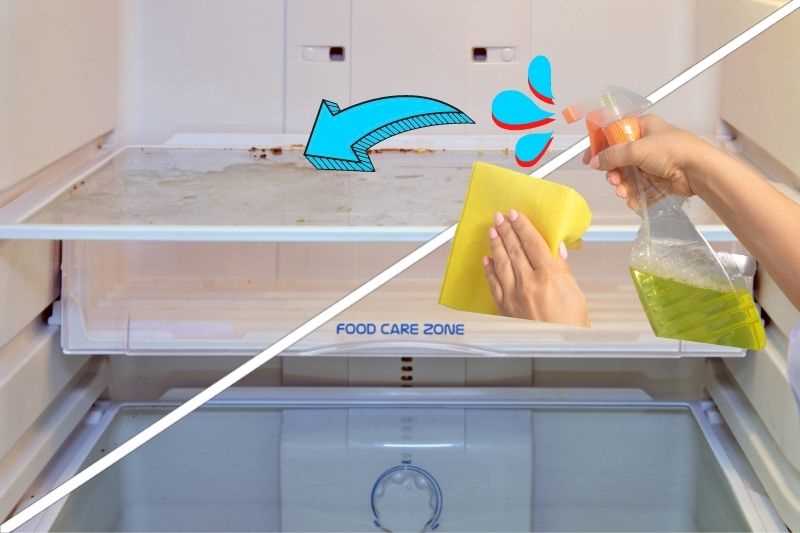
Proper cleaning and maintenance of your fridge are essential to prevent unpleasant odors. If you notice a bad smell coming from your fridge even when there’s no spoiled food, it could be due to improper cleaning habits. Here are some common mistakes that can contribute to a smelly fridge:
1. Infrequent Cleaning

Cleaning your fridge on a regular basis is crucial to prevent the build-up of food residue and bacteria. If you neglect to clean your fridge regularly, any spilled liquids or food particles can stay in the fridge for an extended period, resulting in a lingering bad smell.
Make it a habit to clean your fridge at least once a month. Remove all the items from the fridge, throw away expired food, and wipe down the interior with a mixture of mild soap and water. Pay special attention to the shelves, door seals, and drawers.
2. Ignoring the Drip Tray
The drip tray is a small container located at the bottom of your fridge. Its purpose is to collect water that condenses on the fridge’s cooling coils. Over time, this water can mix with food debris and bacteria, causing a foul smell.
Remove the drip tray and clean it regularly using warm soapy water. This will help prevent unpleasant odors from developing in your fridge.
3. Neglecting the Freezer
Even if your fridge doesn’t have any spoiled food, the freezer can still be a source of bad smells. Over time, ice can absorb odors from other food items stored in the freezer, resulting in a smelly freezer compartment.
Regularly defrost your freezer and clean it thoroughly. Remove any old or expired items and wipe down the shelves and walls with a mixture of vinegar and water to eliminate any lingering odors.
4. Not Removing Old Containers and Leftovers
Leftover food containers or forgotten leftovers can easily get pushed to the back of the fridge and go unnoticed. Over time, these old containers can start to develop a strong smell.
Regularly check the back of your fridge and remove any old containers or leftovers. Clean out the fridge thoroughly and sanitize it to prevent any odors from returning.
5. Ignoring the Fridge Gasket
The rubber gasket that seals the fridge door is prone to collecting food debris, crumbs, and grime. If not cleaned regularly, it can become a breeding ground for bacteria, leading to a bad smell.
Wipe down the gasket regularly with a mixture of mild soap and warm water. Ensure that it is clean and free from any food residue.
By avoiding these improper cleaning and maintenance practices, you can keep your fridge smelling fresh and clean, even without any spoiled food inside.
Tips to Prevent and Eliminate Bad Smell in Fridge
1. Keep Your Fridge Clean
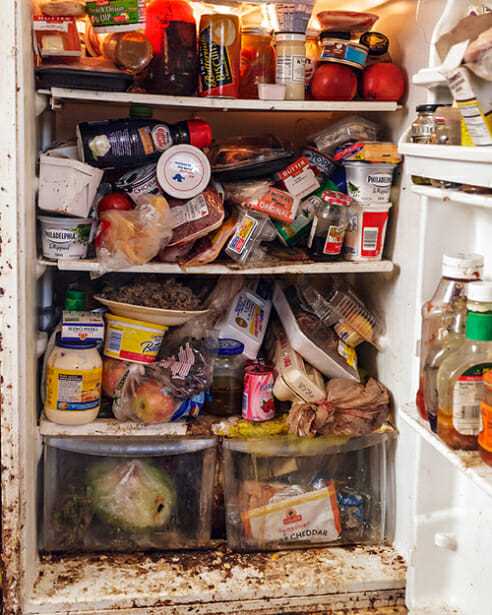
Regularly cleaning your fridge is key to preventing bad smells. Remove all food items and wipe down the shelves, walls, and drawers with a mixture of water and mild detergent. Make sure to clean up any spills or leaks immediately to prevent odors from developing.
2. Use Baking Soda
Placing an open box of baking soda in your fridge can help absorb and neutralize odors. Replace the box every three months for best results. You can also create a homemade deodorizer by mixing baking soda with water to make a paste, then spread it on a plate or shallow dish and place it inside your fridge.
3. Store Food Properly

Properly storing your food can prevent bad smells from developing. Make sure all food items are sealed tightly in containers or wrapped in plastic wrap or aluminum foil. This will prevent strong odors from permeating the fridge and keep your food fresh for longer.
4. Check for Spoiled Food
Regularly check your fridge for any spoiled or expired food items. These can be a major source of bad smells. Remove any spoiled food immediately and clean the area thoroughly. It’s also a good idea to regularly check the expiration dates on your food items and dispose of anything that is past its prime.
5. Keep Fragrant Foods Separated

Strong-smelling foods like onions, garlic, and certain fruits can release odors that can permeate other food items in your fridge. Store these fragrant foods in airtight containers or sealed plastic bags to prevent their odors from spreading to other foods.
6. Use Odor Absorbers
There are several commercial odor absorbers available that can help eliminate bad smells in your fridge. These can be in the form of activated charcoal, odor-absorbing gels, or odor-neutralizing cubes. Place these products in your fridge according to the manufacturer’s instructions to effectively eliminate odors.
7. Regularly Defrost Your Freezer
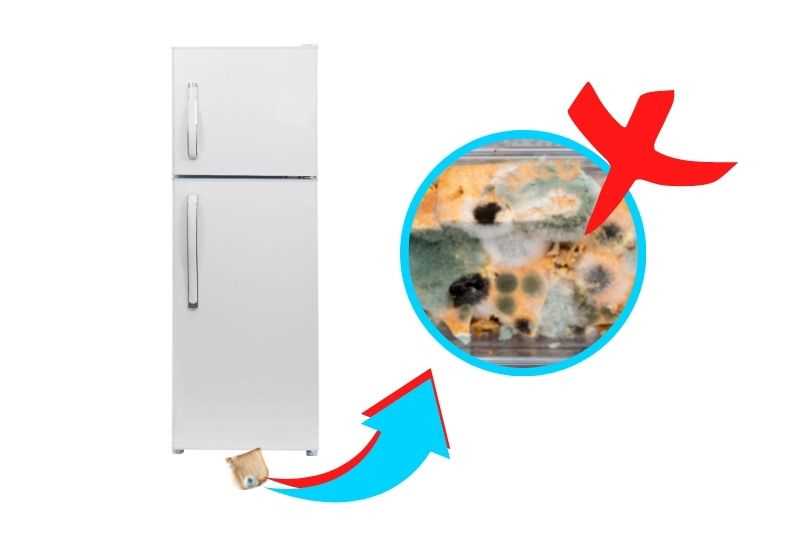
If your fridge has a freezer compartment, it’s important to regularly defrost it to prevent ice buildup and freezer burn. Excess ice can contribute to bad odors in your fridge. Follow the manufacturer’s recommendations for defrosting your freezer and remove any ice buildup as needed.
8. Keep Your Fridge Well-Ventilated
A well-ventilated fridge can prevent the buildup of moisture and odors. Make sure that the ventilation slots in your fridge are not blocked and are clear of any obstructions. This will allow for proper air circulation and help prevent the growth of mold and bacteria that can cause bad smells.
9. Use Natural Deodorizers
There are several natural deodorizers that can help eliminate bad smells in your fridge. Placing a bowl of white vinegar or coffee grounds in your fridge can help absorb and neutralize odors. Lemon slices or orange peels can also give your fridge a fresh citrus scent.
By following these tips, you can prevent and eliminate bad smells in your fridge, ensuring that it remains fresh and odor-free.
FAQ
Why does my fridge smell bad even when there’s no spoiled food?
There could be several reasons for a bad smell in your fridge even when there’s no spoiled food. One possible cause is the accumulation of bacteria or mold in the fridge’s interior, which can produce unpleasant odours. Another reason could be a dirty condenser coil, which can cause the fridge to emit a foul smell. Additionally, a malfunctioning or improperly sealed fridge can allow outside odours to enter and mix with the air inside the fridge, resulting in a bad smell.
How can I get rid of the bad smell in my fridge?
To get rid of the bad smell in your fridge, start by removing all the food and thoroughly cleaning the interior with a mixture of warm water and baking soda. Pay special attention to shelves, drawers, and any other areas where food particles may have accumulated. After cleaning, leave an open container of baking soda or activated charcoal in the fridge to absorb any remaining odours. You can also place a small dish of vanilla extract or coffee grounds in the fridge to help eliminate the smell.
Is it possible for a fridge to smell bad due to a malfunction?
Yes, it is possible for a fridge to smell bad due to a malfunction. A malfunctioning fridge can cause food to spoil more quickly, leading to unpleasant odours. Additionally, a faulty or blocked drain tube can result in water accumulation and mold growth, which can cause a bad smell. If you suspect that your fridge is malfunctioning, it is recommended to contact a professional technician to diagnose and fix the issue.
Can a dirty condenser coil cause a bad smell in the fridge?
Yes, a dirty condenser coil can cause a bad smell in the fridge. The condenser coil is responsible for releasing heat from the fridge, and if it becomes dirty or clogged with dust and debris, it can cause the fridge to emit a foul smell. To clean the condenser coil, you can use a vacuum cleaner with a brush attachment or a coil cleaning brush. It is important to unplug the fridge before cleaning the condenser coil to avoid any electrical accidents.
Why does my fridge smell like chemicals even when it’s clean?
If your fridge smells like chemicals even when it’s clean, there could be a few possible explanations. One possibility is that the fridge has a strong plastic or rubber smell, which can sometimes be mistaken for chemicals. This is especially common with new fridges and should fade over time. Another reason could be the use of strong cleaning agents that leave behind a chemical odour. It is recommended to use mild, scent-free cleaning solutions when cleaning the fridge to avoid any lingering chemical smells.
How can I prevent my fridge from smelling bad?
To prevent your fridge from smelling bad, it is important to practice good food storage and cleanliness habits. Make sure to properly seal all food containers to prevent odours from spreading. Regularly clean spills and remove any expired or spoiled food. Keep an open box of baking soda or activated charcoal in the fridge to absorb odours. Additionally, make sure the fridge is at the correct temperature (between 35°F and 38°F or 2°C and 4°C) as higher temperatures can speed up food spoilage and result in bad smells.
What should I do if the bad smell in my fridge persists even after cleaning?
If the bad smell in your fridge persists even after cleaning, there could be an underlying issue that requires professional attention. It is possible that there may be a hidden source of odor, such as a leak or a blocked drain, that is causing the smell. In such cases, it is recommended to contact a professional technician to inspect and diagnose the problem. They will be able to identify the source of the smell and provide the appropriate solution.






